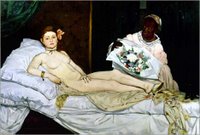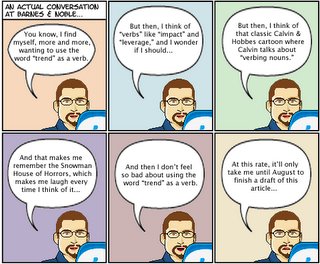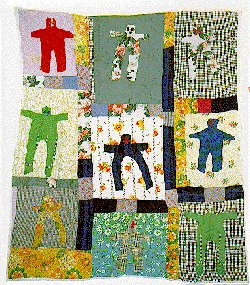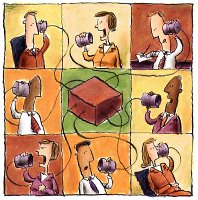 Manet's Olympia (1865)
Manet's Olympia (1865)
See here
Bakhtin, M. (1986). Speech Genres and other Late Essays. Austin, Texas: University of Texas Press.
Bawarshi, A. (2003). Genre and the Invention of the Writer: Reconsidering the Place of Invention in Composition. Utah State University Press.
Bazerman, C. (1994). “Systems of Genres and the Enactment of Social Institutions.” Genre and the New Rhetoric. Eds. Aviva Freedman and Peter Medway. London: Taylor. 79–101.
Bazerman, C. (1997). ‘The Life of Genre, the Life of the Classroom’ in Bishop, W. and Ostrom, H. eds.
Online at http://education.ucsb.edu/%7Ebazerman/chapters1.htm
Bazerman, C. (2002). 'Genre and Identity: Citizenship in the Age of the Internet and the Age of Global Capitalism' in Coe, R., Lingard, L, Teslenko, T. Eds.
Online at http://education.ucsb.edu/%7Ebazerman/chapters1.htm
Bazerman, C. (2003). 'Social Forms as Habitats for Action'16:2 (2003): 123-142. Journal of The Interdisciplinary Crossroads. 16.2: 123-142.
Online at http://education.ucsb.edu/~bazerman/articles1.htm
Bazerman, C. (2003). The Production of Information for Genred Activity Spaces'. Written Communication 20:4.
Online at http://education.ucsb.edu/~bazerman/articles1.htm.
Bazerman, C. (2003). 'What is Not Institutionally Visible Does Not Count: The Problem of Making Activity Assessable, Accountable, and Plannable' in Bazerman, C. and Russel, D eds. Writing Selves/Writing SocietiesResearch from Activity Perspectives. Electronic book, see http://wac.colostate.edu/books/selves_societies/bazerman/ especially section 9).
Bazerman, C. (2004). 'Speech Acts, Genres, and Activity Systems: How Texts Organize Activities and People.' What Writing Does and How it Does it. Eds. Charles Bazerman and Paul Prior. Mahwah, NJ: Lawrence Erlbaum. 309–339.
Beebe, T. O. (1994). The Ideology of Genre: a Comparative Study of Generic Instability. Penn State University Press.
Berkinkotter, C. (1993). 'A "Rhetoric for Naturalistic Enquiry" and the Question of Genre.' Research in the Teaching of English, 27: 293-304.
Berkinkotter, C. and Huckin, T. (1995) Genre Knowledge in Disciplinary Communication. Hillsdale NJ: Lawrence Erlbaum.
Bett, W. (1988). The Jury Summation as a Speech Genre. Amsterdam: John Benjamins.
Bhatia, V. (1993). Analysing Genre. London/New York: Longman.
Bishop, W. and Ostrom, H. eds. (1997). Genre and Writing: Issues, Arguments, Alternatives. Portsmouth NH: Boynton/Cook Heinemann.
Bitzer, L. F. (1968). 'The rhetorical Situation'. Philosophy and Rhetoric, 1: 1-14.
Brent, D. (1994). 'Writing Classes, Writing Genres, and Writing Textbooks'. Textual Studies in Canada, 4: 5-15.
Brooke, R. and Jacobs, D. (1997). ‘Genre in Writing Workshops: Identity Negotiation and Student-Centred Writing’ in Bishop, W. and Ostrom, H. eds.
Campbell, K. and Jamieson, K. eds. (1978). Form and Genre: Shaping Rhetorical Action. Falls Church, VA: Speech Communication Association.
Carter, R. (1997). Investigating English Discourse. London: Routledge.
Chapman, M. (1994). ‘The Emergence of Genres: Some findings from an examination of first-grade writing’ in Written Communication 11.3 pp. 348-380.
Charney, D. and Carison, R. (1995). 'Learning to Write in a Genre: What Student Writers Take from Model Texts'. Research in the Teaching of English, 29.
Christie, F. (1986). ‘Writing in Schools: Generic Structures as Ways of Meaning’ in Couture, B. ed. Functional Approaches to Writing, London: Francis Pinter.
Christie, F. (1992). Literacy in Australia. Annual Review of Applied Lingusitics, 12: 142-55.
Coe, R., Lingard, L. and Teslenko, T. eds. (2002). The Rhetoric and Ideology of Genre. Cresskill, NJ: Hampton Press.
Cohen, R. (1986). 'History and Genre'. New Literary History, 17: 203-18.
Cohen, R. (1991). ‘Genre Theory, Literary History, and Historical Change’ in Perkins, D. ed. Theoretical Issues in Literary History, Cambridge Mass.:Harvard U.P.
Colie, R.L. (1974). The Resources of Kind: Genre Theory in the Renaissance. University of California Press.
Cope, B. and Kalantzis, M. (1993). The Powers of Literacy: A Genre Approach to Teaching Writing. London/Washington: Falmer Press.
Derewianka, B. (1996). Exploring the Writing of Genres. Royston: United Kingdom Reading Association.
Derrida, J. (1981). 'The Law of Genre' in Mitchell, W. ed. On Narrative. Chicago University Press. And in Critical Enquiry, 7: 55-81 (1980).
Devitt, A. (1993) ‘Generalising about Genre: New Conceptions of an Old Concept’. College Composition and Communication 44.4: 573-86.
Devitt, A. (1996) ‘Genre, Genres and the Teaching of Genre’ (review) in College Composition and Communication 47.4: 605-615.
Devitt, A., Reiff, M.J. and Bawarshi, A. (2003). Scenes of Writing: Strategies for Composing with Genres. Longman.
Devitt, A. (2004). Writing Genres. Carbondale: Southern Illinois University Press.
Dowd, G., Stevenson, L. and Strong, J. (2006). Genre Matters: Essays in Theory and Criticism. Exeter: Intellect Books.
Duff, D. (1999). Modern Genre Theory. Longman.
Fahnestock, J. (1993). 'Genre and Rhetorical Craft'. Research in the Teaching of English, 27,3: 50-56.
Freadman, A. (1994). 'Anyone for Tennis?' Genre and the New Rhetoric. London: Taylor and Francis, p. 43–66.
Freadman, A. (2002). 'Uptake.' The Rhetoric and Ideology of Genre. Eds. Richard Coe, Lorelei Lingard, and Tatiana Teslenko. Cresskill, NJ: Hampton Press. p. 39–53.
Freedman, A. and Medway, P. eds. (1994a). Genre and the New Rhetoric. London: Taylor.
Freedman, A. and Medway, P. eds. (1994b). Learning and Teaching Genre, Portsmouth NH, Boynton/Cook Heinemann.
Freedman, A., Adam, C. and Smart, G. (1994). 'Wearing Suits to Class: Simulating Genres and Simulation as Genre'. Written Communication, 11: 193-226.
Giltrow, J., & Stachan, W. (1996). '“What do you think?” Genre-based response to student-writing: Strategies from research'. Paper presented at the European Writing Conference Barcelona, Spain, October 23-25, 1996. Available as pdf from the SIG Writing Publications Archive.
Giltrow, J. (2002). 'Meta-Genre.' The Rhetoric and Ideology of Genre. Eds. Richard Coe, Lorelei Lingard, and Tatiana Teslenko. Cresskill, NJ: Hampton Press. p. 187–205.
Giltrow, J. (2003). Legends of the Centre: System, Self, and Linguistic Consciousness. Writing Selves/Writing Societies: Research from Activity Perspectives, eds. Charles Bazerman and David R. Russell. Electronic book at http://wac.colostate.edu/books/selves_societies/.
Hanks, W. F. (1996). Language and communicative practices. Boulder, CO: Westview.
'Discourse Genres in a Theory of Praxis'.
Hasan, R. (1996). Ways of Seeing: Ways of Meaning. Cassell.
'Text and Context'
'Nursery Tale as Genre'
Halliday, M. and Hasan, R. (1985). Language, Context and Text: Aspects of Language in a Social Semiotic Perspective. Deakin University Press.
Hasan on genre and 'compositional structures'.
Herrington, A. and Moran, C. (2005). Genre Across The Curriculum. Utah State University Press.
*Hicks, D. (190). 'Narrative Skills and Genre Knowledge: Ways of Telling in the Primary School Grades'. Source not known.
Himley, M. (1986). ‘Genre as Generative: one perspective on one child’s early writing growth’ in Nystrand, M. ed. The Structure of Written Communication, New York, Harcourt Brace Jovanovich.
Hyland, K. (2004). Genre and Second Language Writing. Michigan University Press.
Hyon, S. (1996). Genre in Three Traditions: Implications for ESL'. TESOL Quarterly, 30,4: 690-722.
Jamieson, K. (1975). 'Antecedent Genre as Rhetorical Constraint.' Quarterly Journal of Speech 61 (Dec.): 406–15.
Johns, A. (1997). Text, Role, and Context. Cambridge: Cambridge University Press.
Johns, A. (2001). Genre in the Classroom: Multiple Perspectives. Lawrence Erlbaum.
Knapp, P. and Watkins, M. (2005). Genre, Text, Grammar: Technologies for Teaching And Assessing Writing. UNSW Press.
Kress, G. (1999). 'Genre and the Changing Contexts for English Language Arts'. Language Arts, 76,6.
Kress, G and Knapp, P. (1994). ‘Genre in a Social Theory of Language’. English in Education 26.2: 4-15.
Kristeva, J. (1986). The Kristeva Reader. Ed. Moi, T. Oxford: Blackwell.
'The System and the Speaking Subject'
'Word, Dialogue and Novel'
'Revolution in Poetic Language'
Leckie-Tarry, H. (1995). Language and Context. A Functional Linguistic Theory of Register. London and New York: Pinter.
van Leeuwen, T. (1993). 'Genre and Field in Critical Discourse Analysis'. Discourse in Society, 4: 193-223.
Martin, J. and Rothery, J. (1986) ‘What a functional approach to the writing task can show teachers about "good writing"' in Couture, B. ed. Functional Approaches to Writing: Research Perspectives. Norwood, NJ: Ablex.
Martin, J. (1993). ‘Genre and Literacy – Modelling Context in Educational Linguistics’ in Annual Review of Applied Linguistics 13: 141-172.
Martin, J. and Christie, F. eds (1991). Genre And Institutions: Social Processes in the Workplace and School. Continuum.
Miller, C. (1984). ‘Genre as Social Action’. Quarterly Review of Speech, 70: 151-67. Reprinted in Freedman, A. and Medway, P. eds. (1994a).
Oliver, R. (1999). 'Another Look at Genre in the Teaching of Writing'. Paper presented at the International Federation for the Teaching of English Conference, University of Warwick, England. Revised version at http://robconferencepapers.blogspot.com/
Orlikowski, W. and Yates, J. (1994) 'Genre Repertoire: The Structuring of Communicative Practices in Organizations.' Administrative Science Quarterly 39: 541–74.
Orlikowski, W. and Yates, J. (1998). 'Genre Systems: Structuring Interaction Through Communicative Norms'. MIT Sloan School of Management Working Paper #205. See here.
Paltridge, B. (1997). Genre, Frames and Writing in Research Settings. Amsterdam: John Benjamins.
Pardoe, S. (2000). 'Respect and the Pursuit of 'Symmetry' in Researching Literacy and Student Writing' in Barton, D., Hamilton, M. and Ivanic, R. eds. Situated Literacies. London and New York: Routledge.
Prince, M. (1989). 'Literacy and Genre: Toward a Pedagogy of Mediation'. College English, 51: 730-49.
Reid, I. ed (1987). The Place of Genre in Learning: Current Debates. Geelong,Victoria: Centre for Studies in Literary Education.
Richardson, P. (1994). ‘Language as Personal Resource and as Social Construct: Competing Views of Literacy Pedagogy in Australia’ in Freedman,A. and Medway, P. eds. (1994b).
Riley, J. and Reedy, D. (2001). Developing Writing for Different Purposes: Teaching about Genre in the Early Years. Paul Chapman Publishing.
Rockwell, E. (2000). 'Teaching Genres: A Bakhtinian Approach'. Anthropology & Education Quarterly, 31,3: 260-282. **
* Rosen, H. 'The Politics of Writing'. Source not known.
Rubin, R. (1996). ‘The Writing of Research Texts: Genre Analysis and its Applications’ in Rijlarsdam, G., van den Bergh, H. and Couzijn, M. eds. Effective Teaching and Learning of Writing. Amsterdam: Amsterdam U.P.
Russell, D. (1997). 'Rethinking Genre in School and Society: An Activity Theory Analysis.' Written Communication 14: 504–54.
Online at http://www.public.iastate.edu/~drrussel/at&genre/at&genre.html
Russell, D. (1997). 'Writing and Genre in Higher Education and Workplaces'. Mind, Culture and Activity, 4: 224-237.
Russell, D. (2002). 'The Kind-ness of Genre: an Activity Theory Analysis of High School Teachers' Perception of Genre in Portfolio Assessment Across the Curriculum'. In Coe, R., Lingard, J. and Teslenko, T.
Sawyer, W. (ed.). Teaching writing: is genre the answer? Springwood, NSW: Australian Education Network
Schryer, C. (1993). 'Records as Genre.' Written Communication 10: 200–34.
*Smart, G. and Jones, G. (2006). Writing the Economy: Activity, Genre And Technology in the World of Banking. Equinox Publishing.
Spinuzzi, C. (2003). Tracing Genres Through Organisations. MIT Press.
Swales, J. (1991). Genre Analysis. Cambridge: Cambridge U.P.
Swales, J. (1993). 'Genre and Engagement'. Revue Belge de Philologie et d'Histoire, 71: 687-98.
*Tardy, C. (2003). 'A Genre System View of the Funding of Academic Research.' Written Communication 20: 7–36.
Threadgold, T. (1989). ‘Talking about Genre: Ideologies and Incompatible Discourses’ in Cultural Studies 3.1: 101-27.
Threadgold, T. (1994). 'Grammar, genre and the ownership of literacy.' Idiom, 2: 20-28.
Threadgold, T. and Kress, G. (1988). 'Toward a Social Theory of Genre.' Southern Review, Vol.21.3:215-243.
Todorov, T. (1990). Genres in Discourse. Cambridge University Press.
Ventola, E. (1989). 'Problems of Modelling and Applied Issues within the Framework of Genre'. Word, 40: 129-62.
Whitley, D. (2002). 'Writing Fables'. English in Education, 36,1: 17-24.
*Spinuzzi, C. (2003). Tracing genres through organisations: a sociocultural approach to information design. Cambridge, MA: MIT Press. Review at http://informationr.net/ir/reviews/revs147.html
Winsor, D. (1999). 'Genre and Activity Systems: The Role of Documentation in Maintaining and Changing Engineering Activity Systems.' Written Communication 16: 200–24. See http://wcx.sagepub.com/cgi/content/short/16/2/200 for summary and more on genre and activity theory.
Yates, J. and Orlikowski, W. (1992). ‘Genres of Organizational Communication: a Structurational Approach’. Academy of Management Review 17: 299-326.
Yates, J. and Orlikowski, W. (2002). 'Genre Systems: Chronos and Kairos in Communicative Interaction.' The Rhetoric and Ideology of Genre. Eds. Richard Coe, Lorelei Lingard, and Tatiana Teslenko. Cresskill, NJ: Hampton Press. 103–121.
Language and Social Life
Goffman, I. (1959). The Presentation of Self in Everyday Life. Doubleday Anchor.
Goffman, I. (1981). Forms of Talk. University of Pennsylvania Press.
Sperber, D. and Wilson, D. (1986). Relevance: Communication and Cognition. Oxford: Blackwell.
Online
Breure, L. (2001). Development of the Genre Concept. http://www.cs.uu.nl/people/leen/GenreDev/GenreDevelopment.htm#The%20Bakhtin%20Circle plus glossary http://www.cs.uu.nl/people/leen/GenreDev/Glossary.htm
Chandler, D. (1997). An Introduction to Genre Theory.
http://www.aber.ac.uk/media/Documents/intgenre/intgenre.html






